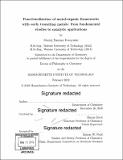Functionalization of metal-organic frameworks with early transition metals : from fundamental studies to catalytic applications
Author(s)
Korzyński, Maciej Damian.
Download1103439826-MIT.pdf (24.68Mb)
Other Contributors
Massachusetts Institute of Technology. Department of Chemistry.
Advisor
Mircea Dincǎ.
Terms of use
Metadata
Show full item recordAbstract
Metal-organic frameworks (MOFs) have established themselves as some of the most versatile materials available, with applications ranging from gas sorption to separation to sensing to catalysis. With a large abundance of structural motifs published to date, research efforts have shifted towards further framework elaboration via post-synthetic modification (PSM), a method to alter the chemical structure of preformed MOFs. The secondary building units (SBUs) of MOFs, which are commonly small inorganic clusters, have been particularly interesting targets for this synthetic approach. The aim of this thesis is to further our understanding of how metal cations interact with these inorganic nodes. Additionally, the node functionalization approach is used to synthesize novel catalysts for the olefin metathesis reaction. In Chapter 1, the reader is introduced to post-synthetic modification of MOFs with a focus on early transition metal species. A review of pertinent literature is presented. Chapter 2 describes how a desire to challenge the limits of the well-precedented cation exchange process led to a serendipitous discovery of a long-sought binding mode in the iconic MOF-5 system using NbCl₄(THF)₂ as a precursor of niobium. In Chapter 3, attention shifts from fundamental studies to the development of new catalysts for olefin metathesis, a process that to (late has been not been extensively studied in MOFs. After a short introduction about the traditional olefin metathesis catalysis, the prospect of using the inorganic nodes of MOFs as supports akin to the classical platforms used in heterogeneous catalysis is explored. Chapter 4 expands the concepts developed in the previous chapter to rhenium oxide-based olefin metathesis, which is unique compared to catalysis using molybdenum and tungsten oxide systems.
Description
Thesis: Ph. D., Massachusetts Institute of Technology, Department of Chemistry, 2019 Cataloged from PDF version of thesis. Includes bibliographical references (pages 191-215).
Date issued
2019Department
Massachusetts Institute of Technology. Department of ChemistryPublisher
Massachusetts Institute of Technology
Keywords
Chemistry.